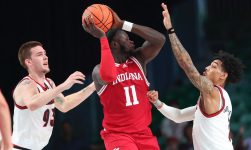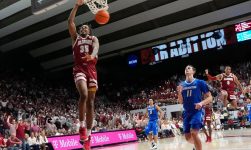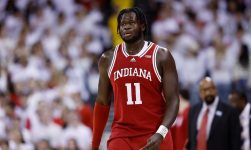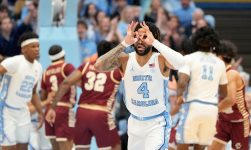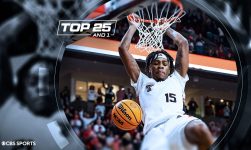College sports’ name, image and likeness landscape took on a grenade Thursday night when Miami guard Isaiah Wong’s NCAA-approved agent went on record to make a threat, the likes of which had never been said on the record in college sports history.
“If Isaiah and his family don’t feel that the NIL number meets their expectations they will be entering the transfer portal tomorrow, while maintaining his eligibility in the NBA draft and going through the draft process,” Wong’s agent, Adam Papas, told ESPN.
In other words: Pay up or we’re out.
What took so long? Athletic directors and coaches have been griping, mostly privately, that something like this was bound to happen. That sound they heard was Pandora’s Box cracking allllll the way open, its contents and potential consequences spewing across the NCAA.
“Insanity!” one power-conference coach texted within minutes of the ESPN.com story being published.
Less than 24 hours later, Wong backed off. He will, after all, not enter the transfer portal. Wong will either return to Miami or he will remain in the NBA Draft and pursue a pro career. (He’s considered a fringe prospect.)
The context: Wong, who just completed his third season with Miami, helped guide the Hurricanes to a surprise Elite Eight run where they lost to eventual national champion Kansas. Fast-forward to April 23. Coveted Kansas State transfer Nijel Pack picks Miami. In a first, billionaire Miami booster John Ruiz co-announces Pack’s decision while also disclosing the business terms of his transfer. Pack agreed to a two-year deal worth $800,000 — and a car — to play for Miami (Ruiz’s alma mater). Never had an announcement like this been done. Obviously, Wong noticed. He’d already signed an inferior NIL deal with LifeWallet, Ruiz’s company. Wong was set to make less than a would-be future teammate who didn’t contribute a single thing to Miami’s first Elite Eight run in program history.
Understandably, Wong wanted more. Apparently he’ll be getting it. The gambit worked, even if Wong’s bluff also kind of got called. This will freak out coaches even more.
Wong had the agency to leave Miami if he didn’t get more money. The program was caught in the middle of this. College players aren’t beholden to playing contracts because they are not professional athletes and they don’t have unions. Wong holding his talent over Miami’s head while engaging in a public stand-off with a billionaire who is not endorsed by or officially affiliated with Miami basketball is an NCAA nightmare. This is exactly what has so many across college sports spooked. What kind of future are we looking at here? In an unintentional way, Wong brought to light maybe the single biggest and most vexing problem facing the NCAA.
However, if you think this is an isolated incident, it’s time to come out of the caves. By choosing to go public with his gripe, Wong has only exposed a reality that has existed for decades: under-the-table brokering to keep, or lure, college talent. In the here and now, what Wong is doing is no different than what is legally (though in some ways questionably) happening elsewhere, just without the publicity or transparency.
You might have missed it, but what Wong did Thursday also happened earlier in the week in much quieter fashion at Wichita State. Craig Porter Jr. averaged 7.3 points, 4.9 rebounds and 3.6 assists for an underperforming Shockers team last season. Like most on Wichita State’s roster, as the program lagged all season in NIL initiatives, Porter recently announced he was going to transfer.
Then Wichita State announced an NIL collective on Tuesday. That same day Porter announced he was staying at the school. Wonder why!
“The change of heart for Porter is directly tied to the arrival of Armchair Strategies, which has worked quickly to put together a package for him to profit on his name, image and likeness,” according to a report from the Wichita Eagle.
The threat worked.
Many highly touted transfers are seeking the bag in similar fashion. Nearly a dozen sources told CBS Sports that 2022 transfers such as Kendric Davis (committed to Memphis), Norchad Omier (Miami), Tyrese Hunter, Baylor Scheierman, Johni Broome, K.J. Williams, Kevin McCullar and Kenneth Lofton Jr. have all sought significant money deals. Although it might not be the primary reason for every one of them, the notion of being recruited to earn hundreds of thousands of dollars helped push all these high-end players into the portal. It’s certainly driving their agents to be aggressive; the commission on some of these deals, sources told CBS Sports, is in the double-digit percentage range.
“For these guys, the NBA is either saying ‘no’ or is saying ‘not yet,’ so, ‘I need to put myself in a place to make the next best professional decision for me, and that is to transfer,'” a coach involved in recruiting one of the players above told CBS Sports. (Coaches are not permitted to speak publicly about unsigned players of theirs.)
That coach also said another one of the players mentioned above is shopping a price of $300,000 for his name, image and likeness rights to pair with his commitment to a school. Multiple sources told CBS Sports that another one of the transfers listed above has an agent who has told schools recruiting him that he believes his client deserves more money than what Nijel Pack received to play at Miami. In essence, if you are a school not willing to align yourself with a company or companies willing to pay north of $400,000 for this player, don’t bother.
“It wasn’t, this is how it might be. It was, ‘This is how it’s going to be,'” one power-conference coach who was looking to recruit that player and spoke with the player’s agent told CBS Sports. “I just needed to hear it for myself.”
Said another coach involved in recruiting that player: “How it went with my assistant was, ‘I’m going to come in and you have to give a competitive offer of what he’s worth and there will be no renegotiating.'”
Yet another player listed above, according to sources, had a representative lie to other schools about how much money he was being offered in an effort to raise that player’s potential NIL deal. Three coaches involved in the recruitment conferred with each other to suss out what was happening.
“Some of this is liar’s poker,” one veteran coach who was previously involved in that recruitment said.
“This was the NCAA’s worst nightmare,” an NBA agent told CBS Sports. “This is the thing they wanted to avoid, and less than 12 months into this [NIL era] it’s happening.”
Things might get even noisier over the weekend. Players have until May 1 to officially request to enter the transfer portal and maintain eligibility at a new school for next season. More than a dozen coaches contacted by CBS Sports said they expect a crush of new names to enter the portal as the deadline approaches.
“Any kid entering the portal starting in the last 72 hours, it is 1,000% about leverage,” one coach at a highly ranked program said. “What all of the sudden changed with your situation to make you do this now? It’s because, in 48 hours, I have no leverage.”
What has this NIL era become? In some ways and for some players it’s a bald negotiation tactic that amounts to a pay-for-play scheme, which is still expressly against the rules.
It’s what Wong has done. He explicitly said he wants more money to continue to play at Miami. Ruiz said Friday he’s trying to make that happen. It’s a contract negotiation, not an NIL sponsorship. It could ultimately — maybe — retroactively be deemed illegal by the NCAA. But who is enforcing these rules? Will they ever be enforced? Are the loopholes so large now they may as well not exist? Many in the sport believe there has to be some redistribution and redefinition of what is a pure NIL play vs. what Wong and others are doing.
For example, there’s a difference between Oscar Tshiebwe being the universal National Player of the Year, assessing his iffy NBA prospects, being informed he stands to become a millionaire if he stays in college basketball, then opting to return to the open arms of everyone surrounding him at Kentucky who wants to make him a rich man. There’s that … then there’s Wong, who is already being paid, is now unsatisfied with his deal, and threatened to bounce.
The NCAA deserves what it’s getting right now. Had Mark Emmert and the organization not rearranged deck chairs and instead tried to put policies into place years ago, college sports wouldn’t be at this seismic period of change where the transfer portal, immediate eligibility and wild-wild-West NIL doings are converging at once to create volcanic levels of chaos behind the scenes. One coach relayed this story, which is both believable and potentially apocryphal: earlier this month a respected power-conference coach had two players walk into his office to ask how they would be able to earn in the neighborhood of $250,000 in NIL compensation.
The coach didn’t have the answers. Best I can tell, those players, to this point, haven’t found that money.
“I had a coach call me yesterday and said ‘I don’t even know what I’m doing,” the NBA agent told CBS Sports. “I have no idea what’s going on.'”
While I’m all for player empowerment, the question is worth asking: Is the current state-by-state-, school-by-school, conference-by-conference NIL model sustainable in the long run? Almost no one in college athletics believes that what is happening right now is viable for the credibility of college athletics going forward. But where are the answers? Nobody seems to have them.
“I don’t know what the solution is, that’s the crazy part,” an SEC coach said.
Said an ACC coach: “There’s no education on how we are allowed to handle this, or at least the education that’s been given is awful. The way the rules are designed right now make zero sense.”
All of this makes for fascinating spectacle. In some ways, it’s entertaining. College basketball has a jolt into its offseason news cycle in ways that’s never happened before. The Wong story broke during the NFL Draft and arguably became the No. 2 story in the midst of one of the busier sports nights of the year. Meanwhile, Miami coach Jim Larranaga got caught in the middle of a business tiff between his best potential returning player and a billionaire booster who’s trying to recruit Miami basketball to a place it’s never been before. He was effectively helpless. By law, he’s not even allowed to engage in conversations with Ruiz about the third-party deals Ruiz is running. Sources said he doesn’t — that Larranaga’s turned off by everything that’s happened here.
Wong’s decision to go public had the feeling of a star NFL running back threatening to hold out, or an NBA player choosing to leak his trade demands through his agent and to the press. College sports has never seen this before. A new era began on Thursday night. What Wong did was more than simply and publicly choosing to play hardball with a billionaire. He exposed the system as it’s forever been played in the shadows. Many in the general public and in the media have sided with player empowerment. Wong’s gambit was received with mixed reviews, though cooler heads (and deeper pockets) have apparently prevailed.
How Wong’s story turns out will help inform how the college sports environment will modify over the course of the spring, summer and fall. Plenty of ADs and coaches are terrified over the fact that, even though Wong balked on his transfer threat, he still will get more money out of this.
“This secondary market of finding these type of players and trying to fill out rosters by paying them off, I don’t think that’s what we wanted to see happen,” the NBA agent said. “And I don’t know if that rule will continue to be, but that’s the way it is now. And until there’s a cautionary tale or the NCAA changes, and if that’s going to be a drawn-out process, it’s our new normal for now.”
On Thursday night free agency truly arrived on a public stage in college sports. It was so drastic, it had one veteran coach pining for the old days.
“Why can’t we go back to how it was,” the coach said. “Just have someone drop a bag, go back to when it was cheating before. I like that world.”

